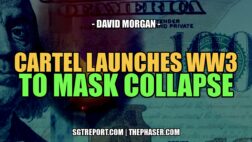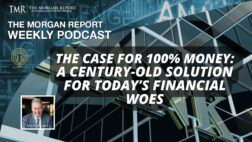Tracy Weslosky: Happy New Year, David. It’s our first Currency Countdown for 2012, how are you today?
David Morgan: I’m well, thank you, Tracy.
Tracy Weslosky: Well let’s talk about what’s happening with the Euro. I’d like to start about the bonds and the impact from the collapse of the Euro. Where do you want to begin?
David Morgan: The overall conditions in Euro, in my view and many commentators is the Eurozone continues to deteriorate, and we’re in a situation where you just cannot get this group of individual countries banded together for political purposes on an economic basis that it is equal for everybody. It’s impossible, and the markets are bearing that out. So strength in one area, weakness in another, and that will continue. As the old adage goes, a chain is as strong as its weakest link. The weak links are several.
You’ve got Spain, Italy, Greece, and others, Ireland. And they’re basically in a depression, these countries. And there’s all kinds of people literally in the streets. So even though France might look good today, and Germany might look good today and the last week or so and there’s all kinds of commentary about resolution of problems and the ECB coming to the rescue. In my view it’s a smoke screen; things are deteriorating basically before our eyes.
Tracy Weslosky: Yes let’s talk about smoke screens. And in particular the impact on bank lending; I would suspect that’s one of the examples of how this is affecting all of us. Can you talk to us about banks and their lending and how they’re going to cope with all of this?
David Morgan: Well that’s the crux of the problem. The basic situation is extremely similar to what happened in the 2008 financial crisis in the United States. And to be specific, what happened at that point was that inter lending– bank to bank loans were not being performed. What that means is that bank A didn’t trust bank B which didn’t trust bank C. Well all these banks are interconnected, but none of them were trusting each other, and the whole system is based on confidence.
So at the last minute, so to speak, and the Fed didn’t waste any time, came in and said “Okay, bank A, B, C, D what we’ll do is we will eat your toxic paper and we will substitute Treasury bills, Treasury notes, Treasury bonds for that paper” and trading continued because all these banks were willing to trade their toxic waste assets for government backed paper. And the system did not fall over the cliff.
We’re in a similar situation the Euro; the interbank lending for all practical purposes has ended. These banks don’t trust each other. You don’t know what the loan rates are, and you don’t know what the discount rate’s going to be in the future. You don’t know how much the interest rate will be pushed up. Basically you just don’t have any confidence between Eurozone countries. However, you still have the ECB, the buyer of last resort similar to the Federal Reserve in the United States. And so even though this over subscription to the French last bond program, which is currently going on, I think that’s more of a, again, smoke screen meaning that the powers that be are there saying “Yeah, yeah we want buy French debt.”
Sure they do. Well fine, the real truth of the matter is that these banks are scared to death. They don’t trust each other, and that further deteriorates the system. So I think we’re getting near the end game here.
Tracy Weslosky: I want to talk about the Asian markets and how they’ve been impacted. It seems that the press is starting to see a correlation; what do you think?
David Morgan: Global markets have been global for some time. I mean regardless of the different currencies, everybody is tied together. I mean without the export ability of China, and the ability of the Westernized nations, Europe as well, to be able to export funny money to the producers you’re not going to have world trade. So we’re all interconnected. And we’re all connected to the U.S. dollar, although that has been lagging of late, meaning more and more we’re seeing Russia and China say “We will trade with each other without going through the dollar first.”
It happened again recently with other countries and China. Some entities and nation states are going to use the Yuan directly and peg some of their trades in the Yuan without going to or pegging to the dollar. So you’re seeing more and more undertones in the real world where trade will continue but the dollar isn’t used as the supreme currency, and that trend will continue.
Tracy Weslosky: Hitting the ground running in 2012 I’m reading all kinds of documents and e-mails on the impact of reflation, and how this is going to cause a beautiful boomerang in the resource sector. Can you tell me if you agree with that or what everyone’s talking about? Do you think you could define that a little better for our listeners?
David Morgan: I think I can help. I’ll add to it. The defaults are going on left and right. The depression is real in a lot of the European Union, and especially in Eastern Europe. And I think the analogy and even one of the leaders of one of the main banking sectors has used the word “depression” recently. What happens during these defaults is really one of two things. One you default on the currency as we’ve talked about. Or two you can default on your ability to pay back.
And as we’ve discussed on Currency Countdown three weeks ago, when Greece was repositioned at about 50 percent, in other words their bonds were subject to a 50 percent hair cut; they’re now worth half what they were previously. That’s a default or partial default on the bond itself. And the other way is that you default on the currency where it isn’t trusted anymore, and that I think is the route that we’re going to see come to the fore especially in the United States.
So what takes place is the currency becomes worth less and worth less, and finally it’s worthless or perceived to be going to worthlessness. And at that point there is a huge rush in anything tangible.
Tracy Weslosky: I want to ask you about gold and what’s happening with gold right now and for the new year. I thought I’d throw this in.
David Morgan: Well gold is the main barometer for economic health on a global basis. And we’ve had an 11 year run in gold for consistently 11 years in a row the road to gold prices continued to increase year over year over year. I believe that trend is still in place, and I believe for 2012 we’re going to get a new nominal high. If you take the inflation adjusted high of $8.50 January 21st, 1980 and you project it forward to today using government numbers, which are suspect in my view, you would come out with roughly $2,400.00 gold.
I think you’re going to see $2,400.00 gold by the end of 2012. And all that says is that it’s back to its old time high in real terms. So in other words, $2,400.00 equals $850.00, again using government numbers, which again are a bit suspect but that’s the case. And so then I think after that we’ll go up from there. Now obviously I’m making a forecast here, and it could be off but we’ll see.
I really do think that over the next two to three years that as this unwinds further, meaning the global economies and this currency problem continues, you’re going to see a huge flight in to the precious metals, silver included. And a lot of people are going to wake up to the fact that – be it Canada, be it the United States, be it South America or in Asia somewhere, that their savings are being deteriorated and you need to protect yourself. You need to get something of value that will hold value. And since the global economy is much more inner connected than ever before, and the access to precious metals is greater than its ever been before, I think it’s will be the mother of all bull markets in the precious metals. But we’re not there yet, but we’ve certainly built the foundation to build upon to get to that place. So I look for huge increases in real purchasing power for gold and silver over the next few years.
Tracy Weslosky: David, thank you so much for joining me today on Currency Countdown.



